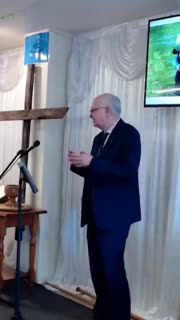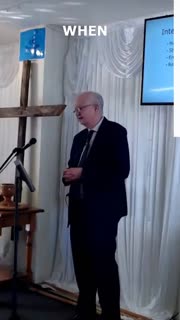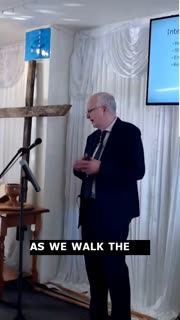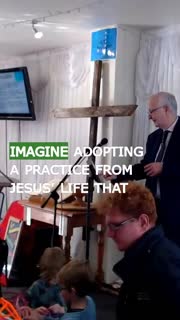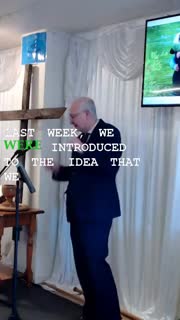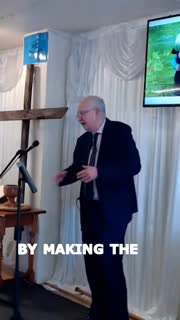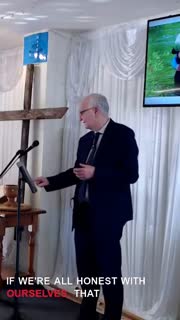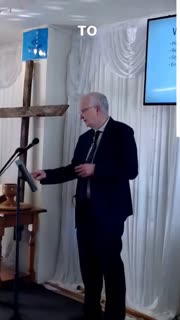Intentional Spiritual Formation: Choices, Disciplines, and Community
Devotional
Sermon Summary
Bible Study Guide
Sermon Clips
### Quotes for Outreach
1. "We are called to worship God in all sorts of ways and worship is not just singing of course, it's more than that. It's why we talk about sung worship in the church. But we'll start with come now is the time. Come now is the time to worship. An invitation to come to God, to put aside all the cares of the world, all the things that have gone wrong this morning, all the things that put pressure on you during the week, school, work or whatever, and come and focus on God." [06:28] (32 seconds)
2. "Unintentional spiritual formation tends to conform us to the world because these are the pressures that are around us constantly, particularly in a country like New Zealand where so much is not of a Christian worldview, where the majority worldview is anything but Christian, or put it another way, for those of us who want to be transformed to be like Jesus, we don't start with a blank piece of paper." [35:45] (37 seconds)
3. "When we practice these spiritual disciplines, we create opportunities for spiritual connection, and inner transformation. The stories we accept as truth significantly influence us. If culture or stories from entertainment and education shape our worldview more than Jesus' teachings and scriptures, we need to deliberately change the stories, the truths we listen to, and embrace new truthful stories." [45:47] (37 seconds)
4. "As we walk the way of Jesus together, the church community helps us become better people, provides a place for healing, and the opportunity to learn to love and forgive. While challenging, community life is essential if we want to really change. And at the core of this change, at the core of this journey, is the Holy Spirit, God's empowering presence within us." [47:29] (34 seconds)
5. "Imagine adopting a practice from Jesus' life that invites the peace of God into our mornings. We heard about it in our group a minute ago. This week's practice encourages us to seek support in God's presence through Scripture. Engaging with the Bible redirects our focus to God, His goodness, His beauty, and His truth. And as we concentrate on Him, we naturally grow to reflect His character. That's because we become what we focus on." [01:04:20] (37 seconds)
### Quotes for Members
1. "Last week, we were introduced to the idea that we were unintentionally spiritually formed. Formed by our habits, our relationships, the stories we believe, our environment, and all this happens. Over time and with experience. During the week, we had the opportunity to undertake and do a formation order to help us understand how these forces have formed us up to this point in our lives." [34:31] (29 seconds)
2. "By making the right choices, mostly, we saw our kids, all these volunteers, move closer to the cross rather than out the door to the world. And we can do the same. But in reality, our journey with Jesus is not always one of moving forward all the time, as we saw that, wasn't it? There was six or seven steps forward and one step backwards. And if we're honest with ourselves, there are times in our apprenticeship journey with Jesus when we have been and maybe are, even right now, just stuck." [36:49] (47 seconds)
3. "If we're all honest with ourselves, that is our apprenticeship journey with Jesus. Initial bursts of enthusiasm, positive change, followed by a cycle of stalling, perhaps even going backwards, going forwards again, and making positive progress, stalling, and on and on and on and on. It's not that we don't want to be transformed, or that we're not trying to be transformed, it's just that the problem is we don't know how. So how do we break the cycle?" [39:18] (33 seconds)
4. "To change our habits, we need the practices of Jesus that redirect our hearts and open us to the Holy Spirit's transformative power. To change the stories we believe, we need Jesus' teachings to fill us with truth. To change the effects of our environment, and our culture on us, we need to live in connection with the Holy Spirit." [42:08] (34 seconds)
5. "As you read Scripture this week, or indeed as you read Scripture any week, any day, any time, remember that the aim of reading God's Word is not merely to gather information, but to experience God in a profound and intimate way. So don't be tempted to rush. Take your time. Spiritual growth happens bit by bit and requires patience and perseverance. It happens over time, much like how we grow naturally in our bodies and our minds. It takes a lifetime. It requires us to constantly choose to make the right choices." [01:06:30] (53 seconds)
Ask a question about this sermon
1. "We are called to worship God in all sorts of ways and worship is not just singing of course, it's more than that. It's why we talk about sung worship in the church. But we'll start with come now is the time. Come now is the time to worship. An invitation to come to God, to put aside all the cares of the world, all the things that have gone wrong this morning, all the things that put pressure on you during the week, school, work or whatever, and come and focus on God." [06:28] (32 seconds)
2. "Unintentional spiritual formation tends to conform us to the world because these are the pressures that are around us constantly, particularly in a country like New Zealand where so much is not of a Christian worldview, where the majority worldview is anything but Christian, or put it another way, for those of us who want to be transformed to be like Jesus, we don't start with a blank piece of paper." [35:45] (37 seconds)
3. "When we practice these spiritual disciplines, we create opportunities for spiritual connection, and inner transformation. The stories we accept as truth significantly influence us. If culture or stories from entertainment and education shape our worldview more than Jesus' teachings and scriptures, we need to deliberately change the stories, the truths we listen to, and embrace new truthful stories." [45:47] (37 seconds)
4. "As we walk the way of Jesus together, the church community helps us become better people, provides a place for healing, and the opportunity to learn to love and forgive. While challenging, community life is essential if we want to really change. And at the core of this change, at the core of this journey, is the Holy Spirit, God's empowering presence within us." [47:29] (34 seconds)
5. "Imagine adopting a practice from Jesus' life that invites the peace of God into our mornings. We heard about it in our group a minute ago. This week's practice encourages us to seek support in God's presence through Scripture. Engaging with the Bible redirects our focus to God, His goodness, His beauty, and His truth. And as we concentrate on Him, we naturally grow to reflect His character. That's because we become what we focus on." [01:04:20] (37 seconds)
### Quotes for Members
1. "Last week, we were introduced to the idea that we were unintentionally spiritually formed. Formed by our habits, our relationships, the stories we believe, our environment, and all this happens. Over time and with experience. During the week, we had the opportunity to undertake and do a formation order to help us understand how these forces have formed us up to this point in our lives." [34:31] (29 seconds)
2. "By making the right choices, mostly, we saw our kids, all these volunteers, move closer to the cross rather than out the door to the world. And we can do the same. But in reality, our journey with Jesus is not always one of moving forward all the time, as we saw that, wasn't it? There was six or seven steps forward and one step backwards. And if we're honest with ourselves, there are times in our apprenticeship journey with Jesus when we have been and maybe are, even right now, just stuck." [36:49] (47 seconds)
3. "If we're all honest with ourselves, that is our apprenticeship journey with Jesus. Initial bursts of enthusiasm, positive change, followed by a cycle of stalling, perhaps even going backwards, going forwards again, and making positive progress, stalling, and on and on and on and on. It's not that we don't want to be transformed, or that we're not trying to be transformed, it's just that the problem is we don't know how. So how do we break the cycle?" [39:18] (33 seconds)
4. "To change our habits, we need the practices of Jesus that redirect our hearts and open us to the Holy Spirit's transformative power. To change the stories we believe, we need Jesus' teachings to fill us with truth. To change the effects of our environment, and our culture on us, we need to live in connection with the Holy Spirit." [42:08] (34 seconds)
5. "As you read Scripture this week, or indeed as you read Scripture any week, any day, any time, remember that the aim of reading God's Word is not merely to gather information, but to experience God in a profound and intimate way. So don't be tempted to rush. Take your time. Spiritual growth happens bit by bit and requires patience and perseverance. It happens over time, much like how we grow naturally in our bodies and our minds. It takes a lifetime. It requires us to constantly choose to make the right choices." [01:06:30] (53 seconds)

